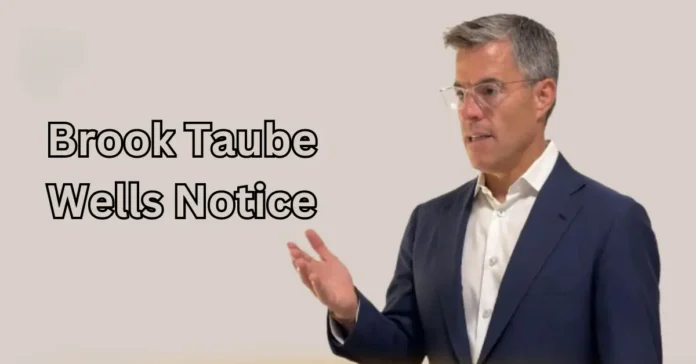1. Introduction to Wells Notices in the Financial Industry
In the complex and highly regulated world of finance, compliance is not just a requirement—it’s a cornerstone of credibility and trust. Among the many tools regulatory bodies use to enforce compliance, the Wells Notice stands out as one that can have significant implications for financial professionals and firms. This article aims to provide an in-depth understanding of Wells Notices, illustrated by the experience of Brook Taube, and offer actionable insights for finance experts navigating this challenging landscape.
2. Understanding the Significance of a Wells Notice
A Wells Notice is a communication from the Securities and Exchange Commission (SEC) or other regulatory bodies notifying individuals or firms of impending enforcement action. It serves as a formal warning that the regulator has gathered sufficient evidence to allege violations of securities laws. The recipient is given the opportunity to respond before any formal charges are filed, making it a critical juncture in the regulatory process.
- Expert Quote: “Receiving a Wells Notice is a critical moment for any financial professional, requiring swift, strategic action.” – [Anonymous Compliance Officer]
3. Brook Taube’s Experience with a Wells Notice
Brook Taube, a prominent figure in the finance industry, has faced the daunting reality of a Wells Notice. His case underscores the importance of vigilance, preparedness, and strategic response when dealing with regulatory challenges. While specific details of his case remain confidential, the broader lessons from his experience are invaluable for finance experts.
- Expert Quote: “Brook Taube’s case is a reminder of the vigilance needed in today’s regulatory environment. It’s not just about compliance; it’s about being a step ahead.” – [Investment Firm CEO]
4. Implications for Finance Experts and Their Firms
The issuance of a Wells Notice can have far-reaching consequences, affecting not only the individual or firm involved but also their clients, investors, and overall market reputation. The notice itself signals potential legal and financial repercussions, including fines, sanctions, and damage to professional credibility.
- Expert Quote: “Understanding the implications and responding effectively to a Wells Notice can make or break a career in finance.” – [Legal Expert in Financial Regulation]
5. How to Respond to a Wells Notice
Act Immediately
Upon receiving a Wells Notice, it’s crucial to act without delay. Seek legal counsel with expertise in securities law and initiate an internal review to understand the scope and specifics of the alleged violations.
Conduct a Thorough Internal Investigation
A comprehensive review of relevant activities, records, and communications is essential to prepare a robust response. This internal investigation should aim to uncover any potential compliance gaps and address them proactively.
Open Dialogue with Regulators
Engage in transparent and constructive communication with the regulatory body. Provide clear, factual information, and address their concerns head-on. This approach can help build a cooperative relationship and potentially mitigate the severity of enforcement actions.
Evaluate and Adjust Compliance Practices
Use the Wells Notice as an opportunity to evaluate and strengthen your firm’s compliance measures. Focus on areas that may have triggered the notice and implement corrective actions to prevent recurrence.
Document Everything
Maintain detailed records of all interactions with regulators and any changes made to internal compliance procedures. These records can serve as valuable evidence of your firm’s commitment to compliance and due diligence.
Stay Informed and Be Prepared
Continuously monitor regulatory updates and best practices in compliance. Staying informed ensures that your response is in line with current standards and expectations, and prepares you for any future regulatory challenges.
Foster a Culture of Compliance
Instill a strong culture of compliance within your organization. Compliance should be more than just a checkbox; it must be ingrained at every level of the firm, demonstrating your commitment to upholding regulatory standards.
- Expert Quote: “Compliance is not just a box to check; it’s a culture that must be ingrained within every level of an organization.” – [Compliance Consultant]
6. Best Practices for Compliance in the Financial Sector
Regular Training and Education
Ensure that all employees receive regular training on compliance policies, industry regulations, and ethical standards. This ongoing education helps maintain a high level of awareness and adherence to compliance requirements.
Risk Management and Assessment
Implement robust risk management and assessment practices to identify potential compliance issues before they escalate. Regular audits and risk assessments can help detect vulnerabilities and address them proactively.
Strong Internal Controls
Establish strong internal controls and monitoring systems to ensure compliance with regulatory requirements. These controls should be designed to detect and prevent any violations, providing an additional layer of protection for your firm.
Transparent Reporting Mechanisms
Create transparent reporting mechanisms for employees to report any suspicious activities or potential compliance breaches. Encourage a whistleblower culture where concerns can be raised without fear of retaliation.
7. Conclusion: The Importance of Staying Vigilant
The experience of receiving a Wells Notice, as illustrated by Brook Taube’s case, underscores the importance of vigilance, preparedness, and a proactive approach to compliance in the financial sector. By understanding the significance of a Wells Notice and implementing best practices for compliance, finance experts can navigate regulatory challenges effectively and uphold their professional integrity.
In a constantly evolving regulatory environment, staying informed and fostering a culture of compliance are not just best practices—they are essential strategies for success. Remember, the key to thriving in the financial industry lies in your ability to anticipate, adapt, and respond to regulatory demands with precision and integrity.
For those looking to delve deeper into compliance strategies and stay ahead of regulatory challenges, consider signing up for our newsletter and accessing our exclusive resources tailored for finance professionals. Together, we can build a more resilient and compliant financial industry.
Related Article: Significance of indexdjx: .dji for Analysts and Investors


